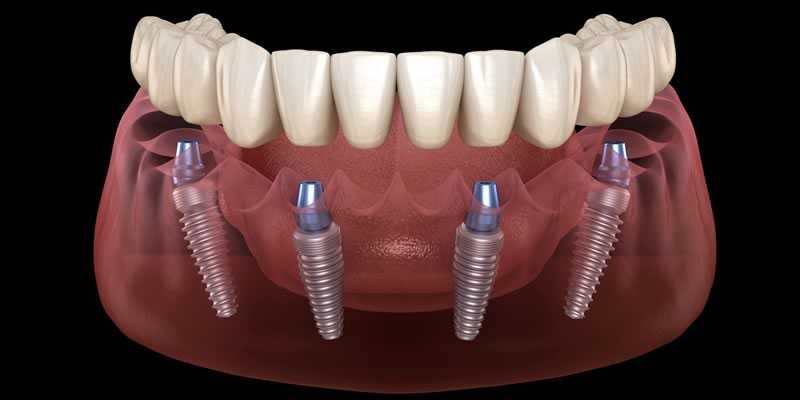Dental work can be a scary task to face. If you’re off to the dentist for dental implants or implant dentures, you probably have a million questions running through your mind. We have a list of FAQs about the dental implant cost, the procedure, and which dentist to visit to put your mind at ease and to ensure that you receive the best dental implants.
Dental Implants FAQ’s
All-on-4 Implants FAQ’s
Snap in Dentures / Overdentures FAQ’s
Denture Stabilization FAQ’s
Questions to ask you Dentist prior to Implants

Dental Implants / Implant Dentures FAQs
What are dental implants?
A dental implant is a permanent way to fill gaps in your smile. Implants are surgical fixtures that are placed into the jawbone and fuse with the bone over the span of a few months. Dental implants are artificial tooth roots that are placed into your jaw to hold a replacement tooth, denture or bridge. It can be an option for people who have lost teeth due to injury, bone loss, or age.
How do dental implants work?
Dental implants are usually made of titanium, and this allows them to integrate with the bone without being recognized as a foreign object in our body. The process includes a fusion between the dental implant and the jawbone and is called “osseointegration”. There is the implant itself, which is placed in the bone. And, then there is the crown that is connected to the implant and replaces the missing tooth. Having a dental implant fused to the jawbone is the closest thing to mimicking a natural tooth because it stands on its own without affecting the nearby teeth and has great stability.
What do dental implants look like?
Dental implants look like natural teeth and are beautifully crafted. The inserts come in all shapes and sizes, yet they have comparable development, resulting in dental implants that look like your natural teeth. They are the most natural tooth replacement option and most people will only be able to tell that you have implants if you tell them that you do.
What are dental implants made of?
Dental implants are made of special materials to create a stable, natural, and long-lasting replacement for your teeth. The materials that dental implants are composed of include titanium ceramic or titanium alloys. When they are placed in the jawbone, the bone will grow around the implants and bond with them as if they were the actual bone. This osseointegration process then allows the implant to function like a natural tooth root, holding the tooth in place and secure, while stimulating the jawbone.
How long does a dental implant procedure take?
If no grafting is needed, you could receive the implant almost immediately. If bone grafting is necessary, grafting will take 3 to 6 months. You can get new permanent prosthetic teeth in just a single session and go home that same day with a fully functional set of pearly whites even if you need a tooth extraction. A single implant may take as little as thirty minutes. A complex surgery or multiple replacements can take more along 3 to 4 hours. The patient then must schedule a follow-up appointment several months later to allow the implant time to heal properly and to fuse with the jawbone.
How long do dental implants last?
Dental implants can last a lifetime and can improve your appearance and your confidence. The average time for long-lasting implants is between 10 and 15 years. Dental implants are not susceptible to dental disease such as decay; however, the health of the bone and back of the gums is vital to maintaining lasting implant success.
How much do dental implants cost?
The cost for a dental implant to replace a single tooth is estimated to be in the range of $3.000 to $4.500, according to The New York Times. However, it is essential that you check with a credentialed dental implant expert for you to receive the lowest possible cost for your implant.
What is the difference between implants vs. bridges vs. dentures?
Implants
Due to their stability, dental implants can be used to support a removable denture and provide a more secure and comfortable fit. One of the biggest benefits of dental implants is that they protect the other teeth. In the case of a dental bridge, the natural teeth must be cut down to perform the function of support.
Bridges and Dentures
Bridges and dentures are false teeth. To get a bridge, you will have to undergo a simple dental procedure that involves no surgery. It is easier and quicker but does not last if a tooth implant. In more traditional versions of the procedure, the two teeth on opposite sides of a gap are shaved down to accommodate a bridge.
Does smoking affect dental implants?
Cigarette smoking is harmful to dental implants, especially if you have had bone graft placement to help secure your implants. A key problem with smoking after dental implants, particularly if you light up within hours or even days of your surgery, is that smoking inhibits the healing process and it causes gum disease. You are putting the longevity of your dental implants at risk if you smoke; therefore, it is recommended that you stop smoking at least a week before your dental implant surgery. It is especially important for smokers as it can help to reduce your risk of suffering from periodontal disease.

All-on-4 Implants – FAQs
What are all-on-4 dental implants?
All-on-4 dental implants are achieved by a technique that uses four implants. It can be used to replace all teeth in a single arch (upper or lower). The implants are strategically placed in areas of good strong bone, and a thin denture prosthesis is screwed into place. All-on-4 implants are a permanent set of fabricated teeth set on dental implants surgically placed into your jaw. They look, feel, and function like natural teeth. All-on-4 dental implants are permanent teeth that can be brushed and cleaned like natural teeth and do not have to be taken out. They also do not need adhesives and are comfortable because they do not press down on your gums.
How long do all-on-4 implants last?
All-on-4 dental implants are comparable to or better than other dental implant systems. These typically last 20 years or beyond. It will, however, be dependent on the following:
- The hygienic habits of the patient (their frequency of brushing, flossing, and water picking),
- The patient’s use of alcohol (how frequent) and smoking,
- Hereditary factors (such as medical conditions), and
- The type of diet the patient follows.
What is the cost of overdentures (snap-in dentures)?
The cost of all-on-4 dental implants is about $1,700. The dental implant cost depends on the condition of the gums and jawbone. The cost for two implants placement for Snap-on dentures starts at about $2,995. The Snap-On denture requires no bone grafting for most patients, which is common in traditional implant procedures. Oral rehabilitation using Snap-on dentures is about a third of traditional implants, but if you want further information or are considering payment plans, it is best to speak directly to your dental office.
What are overdentures made from?
Overdentures consist of four titanium implants inserted into each jaw. These implants act as a foundation for a bridge. A fixed set of teeth, which will look like your natural teeth, can then be added to the implants replacing your teeth.
How often do you brush your overdentures?
Since dental implants should be treated like your natural teeth, daily brushing and flossing are recommended.
When is the overdenture the best option?
It is recommended for patients who need to replace many of their natural teeth. They are also usually good for patients with low bone volume who cannot have a bone graft due to health conditions such as diabetes or osteoporosis. It is ideal for patients who want to make their existing dentures more secure and reduce instability.

Snap in Dentures / Overdentures FAQ’s
How much do snap-in dentures costs?
The cost for snap-in / snap-on dentures averages between $500 and $1.000. There are two things considered by a dentist when determining the cost of snap-on dentures:
- Whether you have the new dentures, and
- Whether you have the supporting dental implants.
Since the design and fabrication of snap-on dentures are like conventional dentures, little preparatory work is required. If the patient presents with a current set of dentures, the cost increases making it more expensive than conventional dentures.
What are overdentures/snap-in dentures?
Snap-on dentures are basically removable dentures; they can be taken out any time by the wearer, but when they’re in the jaw, they are firmly located and will not fall off. The denture itself looks like any other regular denture and, therefore, the appearance is the same. The difference is in the application and the comfort and security of these dentures. Unlike conventional dentures which have the probability of falling off, snap-on dentures remain secured to your jaw via 2 to 4 dental implants.
How to clean snap-in dentures:
As you would with your regular teeth, you should clean your teeth after every main meal of the day by rinsing them with water. Remove them from your mouth and place them under the stream of water from the sink to make sure no visible particles of food are left. You should take a soft toothbrush and clean your tongue and slowly massage your gums and implants, making sure you use a non-abrasive kind of toothpaste. You should have at least one yearly check-up with your dentist for special requirements relating to caring for your dentures.
What is the difference between all-in-4 and snap-on dentures?
Snap-on dentures are not a permanent set of teeth like the all-on-4 implant procedure where the denture is screwed directly over implants. Snap-on dentures use mini implants as an anchorage by snapping onto the O-rings that are adapted on the denture.
What do snap-on dentures look like?
Snap-on dentures can look like natural teeth. They provide improved self-confidence and self-esteem as they are dentures that will stay in place and won’t fall out in public situations.
How long do snap-on dentures last?
Over time the plastic snaps will wear out and will need to be replaced about once every 6 to 12 months. Replacement, however, is easy as we can usually have it done in less than 1 minute.
Which is the best? Snap-on dentures or permanent dentures?
Many people agree that both snap-on dentures and fixed dental implant bridges are a massive improvement over traditional denture. Both do an excellent job of addressing the most common complaints about dentures. Choosing between the two is a personal decision based on your own needs, desires, goals, and budget.
How to stop food from getting into snap-on dentures?
Make sure your dentures are firmly seated on your gums before attempting to chew and make sure you try to distribute food evenly on both sides, place the food as far back on your teeth as you can and work them in a small grinding motion, keep a glass of water handy and take a sip when you have food in your mouth, it will help soften the food and make chewing easier.
How much pain is involved in snap-on dentures?
Most snap-on dentures are palate-less. They won’t rub against your gums, unlike conventional dentures which can cause bruises, cuts, and abrasions. Most experience mild to moderate discomfort for several days after the procedure. If you get several teeth done at once, the discomfort will be higher. However, the discomfort will subside quickly.
How long is the process for snap-on dentures?
Usually, each patient will need two surgeries. During the first surgery, the implants are placed in the jawbone under your gums; while in the second surgery the tops of the implants are exposed. Often, the tooth will be extracted first before the dental implant can be placed.

Denture Stabilization FAQ’s
What are denture stabilization implants AKA Hybrids?
Hybrids are permanent fixed dentures. They are considered the best dental implants. It involves making a small incision into the gum area and removing any rough areas of bone that could cause irritation. A small drill burr is made into the bone. The implant is screwed into place. The remaining implants are then placed in a similar fashion. Small stitches, which will melt away in a few days, are then placed. Materials are added to the denture and then placed in the mouth, allowing it to set over the snap portions of the implants. The denture is then removed, excess silicone is trimmed away, and the denture is seated in your mouth.
How much does denture stabilization cost?
This can cost anywhere from $10,000 to $20,000 for a full set (upper and lower jaw). Costs can depend on the type of implant being used as well as the restoration that will be attached to the implant.
I already have dentures, is denture stabilization worth it?
Yes.
It offers a way to keep dentures in place and allows you to go about your daily life with confidence. The dental implants to stabilize dentures has proven to be successful for many people as it is an effective and long-term, durable treatment. Dental stabilization implants often have the highest success rate of any implanted surgical device.
What are the benefits of stabilizing dentures?
- Restores proper chewing and allows for a better diet and therefore, improved health,
- Improves speech and confidence,
- Increases comfort with less irritation of the gum tissue,
- Ends the cost and inconvenience of denture adhesives,
- Often can utilize your existing denture, and
- Minimally invasive procedure.

Questions to ask your Dentist prior to Dental Implants:
- Who will place my implants?
- What training do you have in placing implants?
- Do you have before and after photos of similar cases?
- Do you offer any kind of guarantee on your implants?
- Does the body ever reject an implant?
- What is the average healing time?
- Am I getting a regular size implant or a mini implant?
- How long will it take from start to finish?
- Are dental implants safe?
- Are dental implants painful?
- How long do dental implants last and what do I need to do to keep them if possible?
For more information on dental implants, contact us today!
